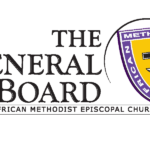Why Aren’t More Black Pastors Talking About Immigration?
By Rev. Lauren Jones, 2nd Episcopal District
When was the last time you heard a sermon about immigration or detention centers in a predominately Black church? I can’t recall the last time either and it’s surprising to me because the Bible is filled with so many stories about those seeking refuge in other countries, including Joseph, Mary, and Jesus fleeing and crossing the borders into Egypt to escape Herod. What is more troubling is that Black churches in mainstream denominations rarely talk about immigration even though statistics report that Black immigrants make up 10 percent of the nation’s Black population. In New York, Black immigrants account for almost 30 percent of the Black population. Florida comes in second with over 20 percent of its Black population being foreign-born. Also, after Mexico and Central America—which have the most detainees by far—the five countries from which people are detained the most are Haiti, Ghana, Dominican Republic, Nigeria, and Jamaica (See the full chart here).
Trump got most of our attention when he referred to predominately Black countries as “s**thole countries.” The soundbites from Sunday morning sermons from pastors of Black churches from around the country were endless; however, that’s where the majority of Black churches’ attention ended. Even the audio clips, videos, and pictures of the inhumane conditions of detention centers in the United States have not proved enough to keep Black churches engaged in advocacy for immigration reform. So what’s the deal?
It could be that Black churches are so bogged down by the systemic injustices that Black Americans face that they don’t have the resources to address issues such as immigration. Police brutality, wage inequalities, health disparities, the preschool-to-prison pipeline, unjust sentencing, and the prison industrial complex are enough to keep any church busy. Many pastors and congregants feel so overwhelmed with the issues that plague our immediate communities that issues such as immigration do not seem like immediate concerns. Oftentimes, they’re working hard to advocate for and meet the needs of their congregations.
The Rev. Dr. George L. Parks, Jr., the senior pastor of New Hope Baptist Church in Little Rock, Arkansas, agrees that Black churches are overwhelmed by systemic issues that directly affect African Americans. He also says, “Integration and upward mobility have given the so-called middle-class Black Americans a false sense of security that we are beyond those types of issues. Assimilation has desensitized us.” However, he states that “The church has a responsibility to the disenfranchised and not just to those who sit in our pews.”
Could it also be that Black churches have strayed from the social justice tradition of the churches before and during the Civil Rights movement? Many of our denominations don’t view advocacy and social justice as part of the Gospel message. I believe some pastors are conflicted. When pastors start to talk about social justice and public policy, many are met with demands from their members to “just preach Jesus” and the pressure from congregants is too much for them to confront.
The “us” versus “them” is prevalent in the Black church, even when it comes to Black migrants. Oftentimes, the othering we fight against as Black Americans is the same tactic we use to defend our lack of political involvement when it comes to immigration. Many times, I have heard that Black Americans don’t feel compelled to advocate for migrants because “They don’t like us either” or when it comes to immigrants from Latin American, “They’re just as racist as White people.”
For example, @JmaihN7 is on Twitter and is originally from Kenya. They now live in the United States and shared with me the following, “An African American pastor once told me that people like me shouldn’t be in this country enjoying the freedoms fought for by the African American slaves.”
I’ve also heard that immigration is “not our fight.” While some believe immigration is not the Black church’s fight, some pastors are connecting with other communities. The Rev. Sydney Williams, the senior pastor of Bethel AME Church in Morristown, New Jersey, says, “I want to see more of our local outreach programs benefiting Hispanic families rather than exclude them.” He also asks, “What are Black congregations doing to welcome our brothers and sisters from Central and South America? They are very much part of the African diaspora whether they consciously embrace it or not.”
Migrants seeking asylum are becoming a new criminalized class. Family separations and the deplorable conditions of detention centers should move us to want to do something, at the very least, to preach about it. We need to pay attention. In the words of the Rev. Dr. Martin Luther King, Jr., “Injustice anywhere is a threat to justice everywhere. We are caught in an inescapable network of mutuality, tied in a single garment of destiny. Whatever affects one directly affects all indirectly.”
For more information, see further Sojourners (Preaching on Immigration),Black Alliance for Just Immigration, and Interfaith Immigration Coalition (Migrant Sunday Liturgy).
The Rev. Lauren Jones is an itinerant elder at Reid Temple AME Church and works as the manager at the Quixote Center.





